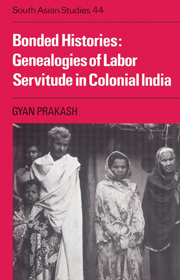Book contents
- Frontmatter
- Contents
- List of illustrations
- List of tables
- Preface
- Conventions followed in the text
- List of abbreviations
- Introduction: the discourse of freedom
- 1 Places of bondage
- 2 True stories
- 3 Land is to objectify
- 4 Freedom found and lost
- 5 Contested power
- Conclusion: freedom bound
- Appendix
- Glossary
- Bibliography
- Index
- CAMBRIDGE SOUTH ASIAN STUDIES
Conclusion: freedom bound
Published online by Cambridge University Press: 22 September 2009
- Frontmatter
- Contents
- List of illustrations
- List of tables
- Preface
- Conventions followed in the text
- List of abbreviations
- Introduction: the discourse of freedom
- 1 Places of bondage
- 2 True stories
- 3 Land is to objectify
- 4 Freedom found and lost
- 5 Contested power
- Conclusion: freedom bound
- Appendix
- Glossary
- Bibliography
- Index
- CAMBRIDGE SOUTH ASIAN STUDIES
Summary
… slavery cannot be abolished without the steam-engine…
Karl Marx and Frederick Engels, The German Ideology, 1846.Steam, the great civilizer, has not done much for this man [kamia], although the railroad runs within a few hundred yards of his door.
Officiating Collector, Monghyr District, 1874....the salvation of the kamia is primarily a question of psychology... The first need is to concentrate on the task of...a specially-selected official and a trained philanthropist who will put heart into these people and give them the moral strength to seize the opportunity which already exists.
Secretary, Revenue Department, Government of Bihar, 1940.Today, it should not come as a surprise that the history of bonded labor in India sheds critical light on the era of western dominance. But if this is all that the kamias' history was to do, then it would not be very significant. For we already live in an age that has witnessed and celebrated the destruction of colonialism by anti-imperialist nationalism, and imperial ideologies no longer command respect. So, the view that colonialism did not live up to its promise, that the nineteenth-century introduction of railways and modern industry, far from inaugurating an era of progress and prosperity instead intensified colonial exploitation, would not provoke much dissent. In fact, transcending the issue of exploitation – so central to the reactive ideologies of imperialism and nationalism – recent scholarship has gone on to explore more subtle and enduring aspects of the colonial experience.
- Type
- Chapter
- Information
- Bonded HistoriesGenealogies of Labor Servitude in Colonial India, pp. 218 - 225Publisher: Cambridge University PressPrint publication year: 1990



